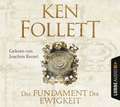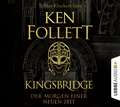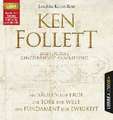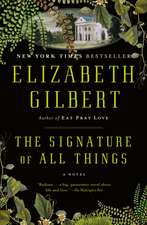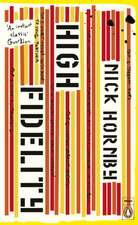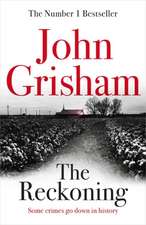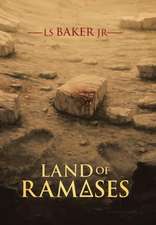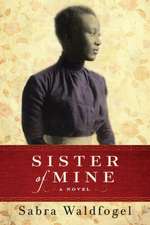The Pillars of the Earth: Kingsbridge-Roman, cartea 1
Autor Ken Folletten Limba Engleză Paperback – 15 iun 2023
| Toate formatele și edițiile | Preț | Express |
|---|---|---|
| Paperback (3) | 65.80 lei 3-5 săpt. | +53.32 lei 4-10 zile |
| Pan Macmillan – 15 iun 2023 | 65.80 lei 3-5 săpt. | +53.32 lei 4-10 zile |
| Penguin Books – 31 iul 1990 | 96.47 lei 17-23 zile | +8.36 lei 4-10 zile |
| Penguin Books – 30 iun 2010 | 145.59 lei 3-5 săpt. | |
| Hardback (1) | 315.41 lei 3-5 săpt. | |
| VIKING – 2 mai 2016 | 315.41 lei 3-5 săpt. |
Preț: 65.80 lei
Preț vechi: 87.91 lei
-25% Nou
Puncte Express: 99
Preț estimativ în valută:
12.59€ • 13.69$ • 10.59£
12.59€ • 13.69$ • 10.59£
Carte disponibilă
Livrare economică 31 martie-14 aprilie
Livrare express 14-20 martie pentru 63.31 lei
Preluare comenzi: 021 569.72.76
Specificații
ISBN-13: 9781035020157
ISBN-10: 1035020157
Pagini: 1086
Dimensiuni: 132 x 199 x 48 mm
Greutate: 0.76 kg
Editura: Pan Macmillan
Colecția Pan Books
Seria Kingsbridge-Roman
ISBN-10: 1035020157
Pagini: 1086
Dimensiuni: 132 x 199 x 48 mm
Greutate: 0.76 kg
Editura: Pan Macmillan
Colecția Pan Books
Seria Kingsbridge-Roman
Recenzii
“Enormous and brilliant …a great epic tale…crammed with characters unbelievably alive across the great gulf of centuries…touches all human emotion—love and hate, loyalty and treachery, hope and despair. See for yourself. This is truly a novel to get lost in.”—Cosmopolitan
“Wonderful…will hold you, fascinate you, surround you.”—Chicago Sun-Times
“An extraordinary epic buttressed by suspense…a monumental masterpiece…A towering triumph from a major talent.”—Booklist
“A seesaw of tension….A novel that entertains, instructs, and satisfies on a grand scale” —Publishers Weekly
“Wonderful…will hold you, fascinate you, surround you.”—Chicago Sun-Times
“An extraordinary epic buttressed by suspense…a monumental masterpiece…A towering triumph from a major talent.”—Booklist
“A seesaw of tension….A novel that entertains, instructs, and satisfies on a grand scale” —Publishers Weekly
Extras
Chapter 1In a broad valley, at the foot of a sloping hillside, beside a clear bubbling stream, Tom was building a house.
The walls were already three feet high and rising fast. The two masons Tom had engaged were working steadily in the sunshine, their trowels going scrape, slap and then tap, tap while their laborer sweated under the weight of the big stone blocks. Tom’s son Alfred was mixing mortar, counting aloud as he scooped sand onto a board. There was also a carpenter, working at the bench beside Tom, carefully shaping a length of beech wood with an adz.
Alfred was fourteen years old, and tall like Tom. Tom was a head higher than most men, and Alfred was only a couple of inches less, and still growing. They looked alike too: both had light-brown hair and greenish eyes with brown flecks. People said they were a handsome pair. The main difference between them was that Tom had a curly brown beard, whereas Alfred had only a fine blond fluff. The hair on Alfred’s head had been that color once, Tom remembered fondly. Now that Alfred was becoming a man, Tom wished he would take a more intelligent interest in his work, for he had a lot to learn if he was to be a mason like his father; but so far Alfred remained bored and baffled by the principles of building.
When the house was finished it would be the most luxurious home for miles around. The ground floor would be a spacious undercroft, for storage, with a curved vault for a ceiling, so that it would not catch fire. The hall, where people actually lived, would be above, reached by an outside staircase, its height making it hard to attack and easy to defend. Against the hall wall there would be a chimney, to take away the smoke of the fire. This was a radical innovation: Tom had only ever seen one house with a chimney, but it had struck him as such a good idea that he was determined to copy it. At one end of the house, over the hall, there would be a small bedroom, for that was what earls’ daughters demanded nowadays—they were too fine to sleep in the hall with the men and the serving wenches and the hunting dogs. The kitchen would be a separate building, for every kitchen caught fire sooner or later, and there was nothing for it but to build them far away from everything else and put up with lukewarm food.
Tom was making the doorway of the house. The doorposts would be rounded to look like columns—a touch of distinction for the noble newlyweds who were to live here. With his eye on the shaped wooden template he was using as a guide, Tom set his iron chisel obliquely against the stone and tapped it gently with the big wooden hammer. A small shower of fragments fell away from the surface, leaving the shape a little rounder. He did it again. Smooth enough for a cathedral.
He had worked on a cathedral once—Exeter. At first he had treated it like any other job. He had been angry and resentful when the master builder had warned him that his work was not quite up to standard: he knew himself to be rather more careful than the average mason. But then he realized that the walls of a cathedral had to be not just good, but perfect. This was because the cathedral was for God, and also because the building was so big that the slightest lean in the walls, the merest variation from the absolutely true and level, could weaken the structure fatally. Tom’s resentment turned to fascination. The combination of a hugely ambitious building with merciless attention to the smallest detail opened Tom’s eyes to the wonder of his craft. He learned from the Exeter master about the importance of proportion, the symbolism of various numbers, and the almost magical formulas for working out the correct width of a wall or the angle of a step in a spiral staircase. Such things captivated him. He was surprised to learn that many masons found them incomprehensible.
After a while Tom had become the master builder’s right-hand man, and that was when he began to see the master’s shortcomings. The man was a great craftsman and an incompetent organizer. He was completely baffled by the problems of obtaining the right quantity of stone to keep pace with the masons, making sure that the blacksmith made enough of the right tools, burning lime and carting sand for the mortar makers, felling trees for the carpenters, and getting enough money from the cathedral chapter to pay for everything.
If Tom had stayed at Exeter until the master builder died, he might have become master himself; but the chapter ran out of money—partly because of the master’s mismanagement—and the craftsmen had to move on, looking for work elsewhere. Tom had been offered the post of builder to the Exeter castellan, repairing and improving the city’s fortifications. It would have been a lifetime job, barring accidents. But Tom had turned it down, for he wanted to build another cathedral.
His wife, Agnes, had never understood that decision. They might have had a good stone house, and servants, and their own stables, and meat on the table every dinnertime; and she had never forgiven Tom for turning down the opportunity. She could not comprehend the irresistible attraction of building a cathedral: the absorbing complexity of organization, the intellectual challenge of the calculations, the sheer size of the walls, and the breathtaking beauty and grandeur of the finished building. Once he had tasted that wine, Tom was never satisfied with anything less.
That had been ten years ago. Since then they had never stayed anywhere for very long. He would design a new chapter house for a monastery, work for a year or two on a castle, or build a town house for a rich merchant; but as soon as he had some money saved he would leave, with his wife and children, and take to the road, looking for another cathedral.
He glanced up from his bench and saw Agnes standing at the edge of the building site, holding a basket of food in one hand and resting a big jug of beer on the opposite hip. It was midday. He looked at her fondly. No one would ever call her pretty, but her face was full of strength: a broad forehead, large brown eyes, a straight nose, a strong jaw. Her dark, wiry hair was parted in the middle and tied behind. She was Tom’s soul mate.
She poured beer for Tom and Alfred. They stood there for a moment, the two big men and the strong woman, drinking beer from wooden cups; and then the fourth member of the family came skipping out of the wheat field: Martha, seven years old and as pretty as a daffodil, but a daffodil with a petal missing, for she had a gap where two milk teeth had fallen out and the new ones had not yet grown. She ran to Tom, kissed his dusty beard, and begged a sip of his bear. He hugged her bony body. “Don’t drink too much, or you’ll fall into a ditch,” he said. She staggered around in a circle, pretending to be drunk.
They all sat down on the woodpile. Agnes handed Tom a hunk of wheat bread, a thick slice of boiled bacon and a small onion. He took a bite from the meat and started to peel the onion. Agnes gave the children food and began to eat her own. Perhaps it was irresponsible, Tom thought, to turn down that dull job in Exeter and go looking for a cathedral to build; but I’ve always been able to feed them all, despite my recklessness.
He took his eating knife from the front pocket of his leather apron, cut a slice off the onion, and ate it with a bite of bread. The onion was sweet and stinging in his mouth. Agnes said: “I’m with child again.”
Tom stopped chewing and stared at her. A thrill of delight took hold of him. Not knowing what to say, he just smiled foolishly at her. After a few moments she blushed, and said, “It isn’t that surprising.”
Tom hugged her. “Well, well,” he said, still grinning with pleasure. “A babe to pull my beard. And I thought the next would be Alfred’s.”
“Don’t get too happy yet,” Agnes cautioned. “It’s bad luck to name the child before it’s born.”
Tom nodded assent. Agnes had had several miscarriages and one stillborn baby, and there had been another little girl, Matilda, who had lived on two years. “I’d like a boy, though,” he said. “Now that Alfred’s so big. When is it due?”
“After Christmas.”
Tom began to calculate. The shell of the house would be finished by first frost, then the stonework would have to be covered with straw to protect it through the winter. The masons would spend the cold months cutting stones for windows, vaults, doorcases and the fireplace, while the carpenter made floorboards and doors and shutters and Tom built the scaffolding for the upstairs work. Then in spring they would vault the undercroft, floor the hall above it, and put on the roof. The job would feed the family until Whitsun, by which time the baby would be a half year old. Then they would move on. “Good,” he said contentedly. “This is good.” He ate another slice of onion.
“I’m too old to bare children,” said Agnes. “This must be my last.”
Tom thought about that. He was not sure how old she was, in numbers, but plenty of women bore children at her time in life. However, it was true they suffered more as they grew older, and the babies were not as strong. No doubt she was right. But how would she make certain that she would not conceive again? he wondered. Then he realized how, and a cloud shadowed his sunny mood.
“I may get a good job, in a town,” he said, trying to mollify her. “A cathedral, or a palace. Then we might have a big house with wood floors, and a maid to help you with the baby.”
Her face hardened, and she said skeptically: “It may be.” She did not like to hear talk of cathedrals. If Tom had never worked on a cathedral, her face said, she might be living in a town house now, with money saved up and buried under the fireplace, and nothing to worry about.
Tom looked away and took another bite of bacon. They had something to celebrate, but they were in disharmony. He felt let down. He chewed the tough meat for a while, then he heard a horse. He cocked his head to listen. The rider was coming through the trees from the direction of the road, taking a short cut and avoiding the village.
A moment later, a young man on a pony trotted up and dismounted. He looked like a squire, a kind of apprentice knight. “Your lord is coming,” he said.
Tom stood up. “You mean Lord Percy?” Percy Hamleigh was one of the most important men in the country. He owned this valley, and many others, and he was paying for the house.
“His son,” said the squire.
“Young William.” Percy’s son, William, was to occupy this house after his marriage. He was engaged to Lady Aliena, the daughter of the earl of Shiring.
“The same,” said the squire, “And in a rage.”
Tom’s heart sank. At the best of times it could be difficult to deal with the owner of a house under construction. An owner in a rage was impossible. “What’s he angry about?”
“His bride rejected him.”
“The earl’s daughter?” said Tom in surprise. He felt a pang of fear: he had just been thinking how secure his future was. “I thought that was settled.”
“So did we all—except Lady Aliena, it seems,” the squire said. “The moment she met him, she announced that she wouldn’t marry him for all the world and a woodcock.”
Tom frowned worriedly. He did not want this to be true. “But the boy’s not bad-looking, as I recall.”
Agnes said: “As if that made any difference, in her position. If earls’ daughters were allowed to marry whom they please, we’d all be ruled by strolling minstrels and dark-eyed outlaws.”
“The girl may yet change her mind,” Tom said hopefully.
“She will if her mother takes a birch rod to her,” Agnes said.
The squire said: “Her mother’s dead.”
Agnes nodded. “That explains why she doesn’t know the facts of life. But I don’t see why her father can’t compel her.”
The squire said: “It seems he once promised he would never marry her to someone she hated.”
“A foolish pledge!” Tom said angrily. How could a powerful man tie himself to the whim of a girl in that way? Her marriage could affect military alliances, baronial finances… even the building of this house.
The squire said: “She had a brother, so it’s not so important whom she marries.”
“Even so…”
“And the earl is an unbending man,” the squire went on. “He won’t go back on a promise, even one made to a child.” He shrugged. “So they say.”
Tom looked at the low stone walls of the house-to-be. He had not yet saved enough money to keep the family through winter, he realized with a chill. “Perhaps the lad will find another bride to share this place with him. He’s got the whole county to choose from.”
Alfred spoke in a cracked adolescent voice. “By Christ, I think this is him.” Following his gaze, they all looked across the field. A horse was coming from the village in a gallop, kicking up a cloud of dust and earth from the pathway. Alfred’s oath was prompted by the size as well as the speed of the horse: it was huge. Tom had seen beasts like it before, but perhaps Alfred had not. It was a war-horse, as high at the wither as a man’s chin, and broad in proportion. Such war-horses were not bred in England, but came from overseas, and were enormously costly.
Tom dropped the remains of his bread in the pocket of his apron, then narrowed his eyes against the sun and gazed across the field. The horse had its ears back and nostrils flared, but it seemed to Tom that its head was up, a sign that it was not completely out of control. Sure enough, as it came closer the rider leaned back, hauling on the reins, and the huge animal seemed to slow a little. Now Tom could feel the drumming of its hooves in the ground beneath his feet. He looked around for Martha, thinking to pick her up and put her out of harm’s way. Agnes had the same thought. But Martha was not to be seen.
“In the wheat,” Agnes said, but Tom had already figured that out and was striding across the site to the edge of the field. He scanned the waving wheat with fear in his heart but he could not see the child.
The only thing he could think of was to try and slow the horse. He stepped into the path and began to walk toward the charging beast, holding his arms wide. The horse saw him, raised its head for a better look, and slowed perceptibly. Then, to Tom’s horror, the rider spurred it on.
“You damned fool!” Tom roared, although the rider could not hear.
That was when Martha stepped out of the field and into the pathway a few yards in front of Tom.
For an instant Tom stood still in a sick panic. Then he leaped forward, shouting and waving his arms; but this was a war-horse, trained to charge at yelling hordes, and it did not flinch. Martha stood in the middle of the narrow path, staring as if transfixed by the huge beast bearing down on her. There was a moment when Tom realized desperately that he could not get to her before the horse did. He swerved to one side, his arm touching the standing wheat; and at the last instant the horse swerved to the other side. The rise’s stirrup brushed Martha’s fine hair; a hoof stamped a hole in the ground beside her bare foot; then the horse had gone by, spraying them both with dirt, and Tom snatched her up in his arms and held her tight to his pounding heart.
He stood still for a moment, awash with relief, his limbs weak, his insides watery. Then he felt a surge of fury at the recklessness of the stupid youth on his massive war-horse. He looked up angrily. Lord William was slowing the horse now, sitting back in the saddle, with his feet pushed forward into the stirrups, sawing on the reins. The horse swerved to avoid the building site. It tossed its head and then bucked, but William stayed on. He slowed it to a canter and then a trot as he guided it around in a wide circle.
Martha was crying. Tom handed her to Agnes and waited for William. The young lord was a tall, well-built fellow of about twenty years, with yellow hair and narrow eyes which made him look as if he were always peering into the sun. He wore a short black tunic with black hose, and leather shoes with straps crisscrossed up to his knees. He saw well on the horse and did not seem shaken by what had happened. The foolish boy doesn’t even know what he’s done, Tom thought bitterly. I’d like to wring his neck.
William halted the horse in front of the woodpile and looked down at the builders. “Who’s in charge here?” he said.
Tom wanted to say If you had hurt my little girl, I would have killed you, but he suppressed his rage. It was like swallowing a bitter mouthful. He approached the horse and held its bridle. “I’m the master builder,” he said tightly. “My name is Tom.”
“This house is no longer needed,” said William. “Dismiss your men.”
It was what Tom had been dreading. But he held on to the hope that William was being impetuous in his anger, and might be persuaded to change his mind. With an effort, he made his voice friendly and reasonable. “But so much work has been done,” he said. “Why waste what you’ve spent? You’ll need the house one day.”
“Don’t tell me how to manage my affairs, Tom Builder,” said William. “You’re all dismissed.” He twitched a rein, but Tom had hold of the bridle. “Let go of my horse,” said William dangerously.
Tom swallowed. In a moment William would try to get the horse’s head up. Tom felt in his apron pocket and brought out the crust of bread he had been eating. He showed it to the horse, which dipped its head and took a bite. “There’s more to be said, before you leave, my lord,” he said mildly.
William said, “Let my horse go, or I’ll take your head off.” Tom looked directly at him, trying not to show fear. He was bigger than William, but that would make no difference if the young lord drew his sword.
Agnes muttered fearfully, “Do as the lord says, husband.”
There was dead silence. The other workmen stood as still as statues, watching. Tom knew that the prudent thing would be to give in. But William had nearly trampled Tom’s little girl, and that made Tom mad, so with a racing heart he said: “You have to pay us.”
William pulled on the reins but Tom held the bridle tight, and the horse as distracted, nuzzling in Tom’s apron pocket for more food. “Apply to my father for your wages!” William said angrily.
Tom heard the carpenter say in a terrified voice: “We’ll do that, my lord, thanking you very much.”
Wretched coward, Tom thought, but he was trembling himself. Nevertheless he forced himself to say: “If you want to dismiss us, you must pay us, according to the custom. Your father’s house is two days’ walk from here, and when we arrive he may not be there.”
“Men have died for less than this,” William said. His cheeks reddened with anger.
Out of the corner of his eye, Tom saw the squire drop his hand to the hilt of his sword. He knew he should give up now, and humble himself, but there was an obstinate knot of anger in his belly, and as scared as he was he could not bring himself to release the bridle. “Pay us first, then kill me,” he said recklessly. “You may hang for it, or you may not; but you’ll die sooner or later, and then I will be in heaven and you will be in hell.”
The sneer froze on William’s face and he paled. Tom was surprised: what had frightened the boy? Not the mention of hanging, surely: it was not really likely that a lord would be hanged for the murder of a craftsman. Was he terrified of hell?
They stared at one another for a few moments. Tom watched with amazement and relief as William’s set expression of anger and contempt melted away, to be replaced with panicked anxiety. At last William took a leather purse from his belt and tossed it to his squire, saying: “Pay them.”
At that point Tom pushed his luck. When William pulled on the reins again, and the horse lifted its strong head and stepped sideways, Tom moved with the horse and held on to the bridle, and said: “A full week’s wages on dismissal, as is the custom.” He heard a sharp intake of breath from Agnes, just behind him, and he knew she thought he was crazy to prolong the confrontation. But he plowed on. “That’s sixpence for the laborer, twelve for the carpenter and each of the masons, and twenty-four pence for me. Sixty-six pence in all.” He could add pennies faster than anyone he knew.
The squire was looking inquiring at his master. William said angrily: “Very well.”
Tom released the bridle and stepped back.
William turned the horse and kicked it hard, and it bounded forward onto the path through the wheat field.
Tom sat down suddenly on the woodpile. He wondered what had got into him. It had been mad to defy Lord William like that. He felt lucky to be alive.
The hoof beats of William’s war-horse faded to a distant thunder, and his squire emptied the purse onto a board. Tom felt a surge of triumph as the silver pennies tumbled out into the sun-shine. It had been mad, but it had worked: he had secured just payment for himself and the men working under him. “Even lords ought to follow customs,” he said, half to himself.
Agnes heard him. “Just hope you’re never in want of work from Lord William,” she said sourly.
Tom smiled at her. He understood that she was churlish because she was frightened. “Don’t frown too much, or you’ll have nothing but curdled milk in your breasts when that baby is born.”
“I won’t be able to feed any of us unless you find work for the winter.”
“The winter’s a long way off,” said Tom.
The walls were already three feet high and rising fast. The two masons Tom had engaged were working steadily in the sunshine, their trowels going scrape, slap and then tap, tap while their laborer sweated under the weight of the big stone blocks. Tom’s son Alfred was mixing mortar, counting aloud as he scooped sand onto a board. There was also a carpenter, working at the bench beside Tom, carefully shaping a length of beech wood with an adz.
Alfred was fourteen years old, and tall like Tom. Tom was a head higher than most men, and Alfred was only a couple of inches less, and still growing. They looked alike too: both had light-brown hair and greenish eyes with brown flecks. People said they were a handsome pair. The main difference between them was that Tom had a curly brown beard, whereas Alfred had only a fine blond fluff. The hair on Alfred’s head had been that color once, Tom remembered fondly. Now that Alfred was becoming a man, Tom wished he would take a more intelligent interest in his work, for he had a lot to learn if he was to be a mason like his father; but so far Alfred remained bored and baffled by the principles of building.
When the house was finished it would be the most luxurious home for miles around. The ground floor would be a spacious undercroft, for storage, with a curved vault for a ceiling, so that it would not catch fire. The hall, where people actually lived, would be above, reached by an outside staircase, its height making it hard to attack and easy to defend. Against the hall wall there would be a chimney, to take away the smoke of the fire. This was a radical innovation: Tom had only ever seen one house with a chimney, but it had struck him as such a good idea that he was determined to copy it. At one end of the house, over the hall, there would be a small bedroom, for that was what earls’ daughters demanded nowadays—they were too fine to sleep in the hall with the men and the serving wenches and the hunting dogs. The kitchen would be a separate building, for every kitchen caught fire sooner or later, and there was nothing for it but to build them far away from everything else and put up with lukewarm food.
Tom was making the doorway of the house. The doorposts would be rounded to look like columns—a touch of distinction for the noble newlyweds who were to live here. With his eye on the shaped wooden template he was using as a guide, Tom set his iron chisel obliquely against the stone and tapped it gently with the big wooden hammer. A small shower of fragments fell away from the surface, leaving the shape a little rounder. He did it again. Smooth enough for a cathedral.
He had worked on a cathedral once—Exeter. At first he had treated it like any other job. He had been angry and resentful when the master builder had warned him that his work was not quite up to standard: he knew himself to be rather more careful than the average mason. But then he realized that the walls of a cathedral had to be not just good, but perfect. This was because the cathedral was for God, and also because the building was so big that the slightest lean in the walls, the merest variation from the absolutely true and level, could weaken the structure fatally. Tom’s resentment turned to fascination. The combination of a hugely ambitious building with merciless attention to the smallest detail opened Tom’s eyes to the wonder of his craft. He learned from the Exeter master about the importance of proportion, the symbolism of various numbers, and the almost magical formulas for working out the correct width of a wall or the angle of a step in a spiral staircase. Such things captivated him. He was surprised to learn that many masons found them incomprehensible.
After a while Tom had become the master builder’s right-hand man, and that was when he began to see the master’s shortcomings. The man was a great craftsman and an incompetent organizer. He was completely baffled by the problems of obtaining the right quantity of stone to keep pace with the masons, making sure that the blacksmith made enough of the right tools, burning lime and carting sand for the mortar makers, felling trees for the carpenters, and getting enough money from the cathedral chapter to pay for everything.
If Tom had stayed at Exeter until the master builder died, he might have become master himself; but the chapter ran out of money—partly because of the master’s mismanagement—and the craftsmen had to move on, looking for work elsewhere. Tom had been offered the post of builder to the Exeter castellan, repairing and improving the city’s fortifications. It would have been a lifetime job, barring accidents. But Tom had turned it down, for he wanted to build another cathedral.
His wife, Agnes, had never understood that decision. They might have had a good stone house, and servants, and their own stables, and meat on the table every dinnertime; and she had never forgiven Tom for turning down the opportunity. She could not comprehend the irresistible attraction of building a cathedral: the absorbing complexity of organization, the intellectual challenge of the calculations, the sheer size of the walls, and the breathtaking beauty and grandeur of the finished building. Once he had tasted that wine, Tom was never satisfied with anything less.
That had been ten years ago. Since then they had never stayed anywhere for very long. He would design a new chapter house for a monastery, work for a year or two on a castle, or build a town house for a rich merchant; but as soon as he had some money saved he would leave, with his wife and children, and take to the road, looking for another cathedral.
He glanced up from his bench and saw Agnes standing at the edge of the building site, holding a basket of food in one hand and resting a big jug of beer on the opposite hip. It was midday. He looked at her fondly. No one would ever call her pretty, but her face was full of strength: a broad forehead, large brown eyes, a straight nose, a strong jaw. Her dark, wiry hair was parted in the middle and tied behind. She was Tom’s soul mate.
She poured beer for Tom and Alfred. They stood there for a moment, the two big men and the strong woman, drinking beer from wooden cups; and then the fourth member of the family came skipping out of the wheat field: Martha, seven years old and as pretty as a daffodil, but a daffodil with a petal missing, for she had a gap where two milk teeth had fallen out and the new ones had not yet grown. She ran to Tom, kissed his dusty beard, and begged a sip of his bear. He hugged her bony body. “Don’t drink too much, or you’ll fall into a ditch,” he said. She staggered around in a circle, pretending to be drunk.
They all sat down on the woodpile. Agnes handed Tom a hunk of wheat bread, a thick slice of boiled bacon and a small onion. He took a bite from the meat and started to peel the onion. Agnes gave the children food and began to eat her own. Perhaps it was irresponsible, Tom thought, to turn down that dull job in Exeter and go looking for a cathedral to build; but I’ve always been able to feed them all, despite my recklessness.
He took his eating knife from the front pocket of his leather apron, cut a slice off the onion, and ate it with a bite of bread. The onion was sweet and stinging in his mouth. Agnes said: “I’m with child again.”
Tom stopped chewing and stared at her. A thrill of delight took hold of him. Not knowing what to say, he just smiled foolishly at her. After a few moments she blushed, and said, “It isn’t that surprising.”
Tom hugged her. “Well, well,” he said, still grinning with pleasure. “A babe to pull my beard. And I thought the next would be Alfred’s.”
“Don’t get too happy yet,” Agnes cautioned. “It’s bad luck to name the child before it’s born.”
Tom nodded assent. Agnes had had several miscarriages and one stillborn baby, and there had been another little girl, Matilda, who had lived on two years. “I’d like a boy, though,” he said. “Now that Alfred’s so big. When is it due?”
“After Christmas.”
Tom began to calculate. The shell of the house would be finished by first frost, then the stonework would have to be covered with straw to protect it through the winter. The masons would spend the cold months cutting stones for windows, vaults, doorcases and the fireplace, while the carpenter made floorboards and doors and shutters and Tom built the scaffolding for the upstairs work. Then in spring they would vault the undercroft, floor the hall above it, and put on the roof. The job would feed the family until Whitsun, by which time the baby would be a half year old. Then they would move on. “Good,” he said contentedly. “This is good.” He ate another slice of onion.
“I’m too old to bare children,” said Agnes. “This must be my last.”
Tom thought about that. He was not sure how old she was, in numbers, but plenty of women bore children at her time in life. However, it was true they suffered more as they grew older, and the babies were not as strong. No doubt she was right. But how would she make certain that she would not conceive again? he wondered. Then he realized how, and a cloud shadowed his sunny mood.
“I may get a good job, in a town,” he said, trying to mollify her. “A cathedral, or a palace. Then we might have a big house with wood floors, and a maid to help you with the baby.”
Her face hardened, and she said skeptically: “It may be.” She did not like to hear talk of cathedrals. If Tom had never worked on a cathedral, her face said, she might be living in a town house now, with money saved up and buried under the fireplace, and nothing to worry about.
Tom looked away and took another bite of bacon. They had something to celebrate, but they were in disharmony. He felt let down. He chewed the tough meat for a while, then he heard a horse. He cocked his head to listen. The rider was coming through the trees from the direction of the road, taking a short cut and avoiding the village.
A moment later, a young man on a pony trotted up and dismounted. He looked like a squire, a kind of apprentice knight. “Your lord is coming,” he said.
Tom stood up. “You mean Lord Percy?” Percy Hamleigh was one of the most important men in the country. He owned this valley, and many others, and he was paying for the house.
“His son,” said the squire.
“Young William.” Percy’s son, William, was to occupy this house after his marriage. He was engaged to Lady Aliena, the daughter of the earl of Shiring.
“The same,” said the squire, “And in a rage.”
Tom’s heart sank. At the best of times it could be difficult to deal with the owner of a house under construction. An owner in a rage was impossible. “What’s he angry about?”
“His bride rejected him.”
“The earl’s daughter?” said Tom in surprise. He felt a pang of fear: he had just been thinking how secure his future was. “I thought that was settled.”
“So did we all—except Lady Aliena, it seems,” the squire said. “The moment she met him, she announced that she wouldn’t marry him for all the world and a woodcock.”
Tom frowned worriedly. He did not want this to be true. “But the boy’s not bad-looking, as I recall.”
Agnes said: “As if that made any difference, in her position. If earls’ daughters were allowed to marry whom they please, we’d all be ruled by strolling minstrels and dark-eyed outlaws.”
“The girl may yet change her mind,” Tom said hopefully.
“She will if her mother takes a birch rod to her,” Agnes said.
The squire said: “Her mother’s dead.”
Agnes nodded. “That explains why she doesn’t know the facts of life. But I don’t see why her father can’t compel her.”
The squire said: “It seems he once promised he would never marry her to someone she hated.”
“A foolish pledge!” Tom said angrily. How could a powerful man tie himself to the whim of a girl in that way? Her marriage could affect military alliances, baronial finances… even the building of this house.
The squire said: “She had a brother, so it’s not so important whom she marries.”
“Even so…”
“And the earl is an unbending man,” the squire went on. “He won’t go back on a promise, even one made to a child.” He shrugged. “So they say.”
Tom looked at the low stone walls of the house-to-be. He had not yet saved enough money to keep the family through winter, he realized with a chill. “Perhaps the lad will find another bride to share this place with him. He’s got the whole county to choose from.”
Alfred spoke in a cracked adolescent voice. “By Christ, I think this is him.” Following his gaze, they all looked across the field. A horse was coming from the village in a gallop, kicking up a cloud of dust and earth from the pathway. Alfred’s oath was prompted by the size as well as the speed of the horse: it was huge. Tom had seen beasts like it before, but perhaps Alfred had not. It was a war-horse, as high at the wither as a man’s chin, and broad in proportion. Such war-horses were not bred in England, but came from overseas, and were enormously costly.
Tom dropped the remains of his bread in the pocket of his apron, then narrowed his eyes against the sun and gazed across the field. The horse had its ears back and nostrils flared, but it seemed to Tom that its head was up, a sign that it was not completely out of control. Sure enough, as it came closer the rider leaned back, hauling on the reins, and the huge animal seemed to slow a little. Now Tom could feel the drumming of its hooves in the ground beneath his feet. He looked around for Martha, thinking to pick her up and put her out of harm’s way. Agnes had the same thought. But Martha was not to be seen.
“In the wheat,” Agnes said, but Tom had already figured that out and was striding across the site to the edge of the field. He scanned the waving wheat with fear in his heart but he could not see the child.
The only thing he could think of was to try and slow the horse. He stepped into the path and began to walk toward the charging beast, holding his arms wide. The horse saw him, raised its head for a better look, and slowed perceptibly. Then, to Tom’s horror, the rider spurred it on.
“You damned fool!” Tom roared, although the rider could not hear.
That was when Martha stepped out of the field and into the pathway a few yards in front of Tom.
For an instant Tom stood still in a sick panic. Then he leaped forward, shouting and waving his arms; but this was a war-horse, trained to charge at yelling hordes, and it did not flinch. Martha stood in the middle of the narrow path, staring as if transfixed by the huge beast bearing down on her. There was a moment when Tom realized desperately that he could not get to her before the horse did. He swerved to one side, his arm touching the standing wheat; and at the last instant the horse swerved to the other side. The rise’s stirrup brushed Martha’s fine hair; a hoof stamped a hole in the ground beside her bare foot; then the horse had gone by, spraying them both with dirt, and Tom snatched her up in his arms and held her tight to his pounding heart.
He stood still for a moment, awash with relief, his limbs weak, his insides watery. Then he felt a surge of fury at the recklessness of the stupid youth on his massive war-horse. He looked up angrily. Lord William was slowing the horse now, sitting back in the saddle, with his feet pushed forward into the stirrups, sawing on the reins. The horse swerved to avoid the building site. It tossed its head and then bucked, but William stayed on. He slowed it to a canter and then a trot as he guided it around in a wide circle.
Martha was crying. Tom handed her to Agnes and waited for William. The young lord was a tall, well-built fellow of about twenty years, with yellow hair and narrow eyes which made him look as if he were always peering into the sun. He wore a short black tunic with black hose, and leather shoes with straps crisscrossed up to his knees. He saw well on the horse and did not seem shaken by what had happened. The foolish boy doesn’t even know what he’s done, Tom thought bitterly. I’d like to wring his neck.
William halted the horse in front of the woodpile and looked down at the builders. “Who’s in charge here?” he said.
Tom wanted to say If you had hurt my little girl, I would have killed you, but he suppressed his rage. It was like swallowing a bitter mouthful. He approached the horse and held its bridle. “I’m the master builder,” he said tightly. “My name is Tom.”
“This house is no longer needed,” said William. “Dismiss your men.”
It was what Tom had been dreading. But he held on to the hope that William was being impetuous in his anger, and might be persuaded to change his mind. With an effort, he made his voice friendly and reasonable. “But so much work has been done,” he said. “Why waste what you’ve spent? You’ll need the house one day.”
“Don’t tell me how to manage my affairs, Tom Builder,” said William. “You’re all dismissed.” He twitched a rein, but Tom had hold of the bridle. “Let go of my horse,” said William dangerously.
Tom swallowed. In a moment William would try to get the horse’s head up. Tom felt in his apron pocket and brought out the crust of bread he had been eating. He showed it to the horse, which dipped its head and took a bite. “There’s more to be said, before you leave, my lord,” he said mildly.
William said, “Let my horse go, or I’ll take your head off.” Tom looked directly at him, trying not to show fear. He was bigger than William, but that would make no difference if the young lord drew his sword.
Agnes muttered fearfully, “Do as the lord says, husband.”
There was dead silence. The other workmen stood as still as statues, watching. Tom knew that the prudent thing would be to give in. But William had nearly trampled Tom’s little girl, and that made Tom mad, so with a racing heart he said: “You have to pay us.”
William pulled on the reins but Tom held the bridle tight, and the horse as distracted, nuzzling in Tom’s apron pocket for more food. “Apply to my father for your wages!” William said angrily.
Tom heard the carpenter say in a terrified voice: “We’ll do that, my lord, thanking you very much.”
Wretched coward, Tom thought, but he was trembling himself. Nevertheless he forced himself to say: “If you want to dismiss us, you must pay us, according to the custom. Your father’s house is two days’ walk from here, and when we arrive he may not be there.”
“Men have died for less than this,” William said. His cheeks reddened with anger.
Out of the corner of his eye, Tom saw the squire drop his hand to the hilt of his sword. He knew he should give up now, and humble himself, but there was an obstinate knot of anger in his belly, and as scared as he was he could not bring himself to release the bridle. “Pay us first, then kill me,” he said recklessly. “You may hang for it, or you may not; but you’ll die sooner or later, and then I will be in heaven and you will be in hell.”
The sneer froze on William’s face and he paled. Tom was surprised: what had frightened the boy? Not the mention of hanging, surely: it was not really likely that a lord would be hanged for the murder of a craftsman. Was he terrified of hell?
They stared at one another for a few moments. Tom watched with amazement and relief as William’s set expression of anger and contempt melted away, to be replaced with panicked anxiety. At last William took a leather purse from his belt and tossed it to his squire, saying: “Pay them.”
At that point Tom pushed his luck. When William pulled on the reins again, and the horse lifted its strong head and stepped sideways, Tom moved with the horse and held on to the bridle, and said: “A full week’s wages on dismissal, as is the custom.” He heard a sharp intake of breath from Agnes, just behind him, and he knew she thought he was crazy to prolong the confrontation. But he plowed on. “That’s sixpence for the laborer, twelve for the carpenter and each of the masons, and twenty-four pence for me. Sixty-six pence in all.” He could add pennies faster than anyone he knew.
The squire was looking inquiring at his master. William said angrily: “Very well.”
Tom released the bridle and stepped back.
William turned the horse and kicked it hard, and it bounded forward onto the path through the wheat field.
Tom sat down suddenly on the woodpile. He wondered what had got into him. It had been mad to defy Lord William like that. He felt lucky to be alive.
The hoof beats of William’s war-horse faded to a distant thunder, and his squire emptied the purse onto a board. Tom felt a surge of triumph as the silver pennies tumbled out into the sun-shine. It had been mad, but it had worked: he had secured just payment for himself and the men working under him. “Even lords ought to follow customs,” he said, half to himself.
Agnes heard him. “Just hope you’re never in want of work from Lord William,” she said sourly.
Tom smiled at her. He understood that she was churlish because she was frightened. “Don’t frown too much, or you’ll have nothing but curdled milk in your breasts when that baby is born.”
“I won’t be able to feed any of us unless you find work for the winter.”
“The winter’s a long way off,” said Tom.






